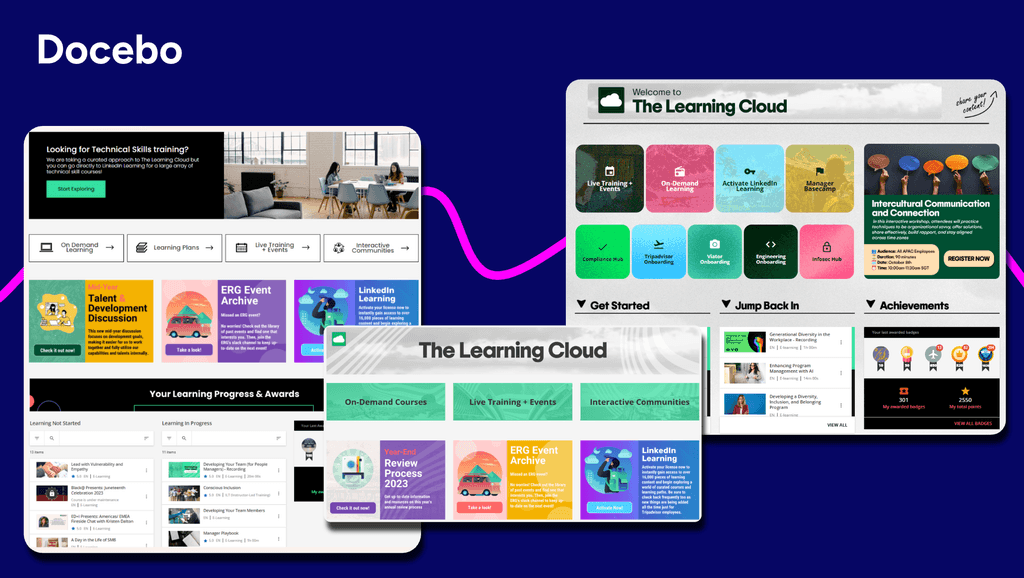Docebo vs Workday vs Sana Labs: Making the best learning platform choice for your company
For Learning & Development leaders, HR teams, and customer enablement professionals, choosing a learning platform is an important decision, one that will impact your people, your customers, your partners, your business.
In 2025, the landscape shifted. Workday made its largest-ever acquisition, buying Sana Labs for ~$1.1B. That move signals how critical learning has become to the future of work. And why it’s more important than ever to seek true learning organizations like Docebo whose sole focus is empowering businesses to foster a culture of learning.
So when it comes to choosing between Docebo and Workday (with Sana folded in), you really are choosing between Docebo’s purpose-built, flexible AI platform for enterprise learning and…what was the choice again?
We josh. Let’s take a look at why you might be looking for an alternative to Workday’s new acquisition, Sana.
Why look for an alternative to Sana Labs and Workday?
Reviews speak for themselves. While both learning platforms have great functionalities, the latest publicly available reviews say…
| Sana Labs LMS cons | Workday LMS cons |
| – “It’s new, so features are still developing. Sometimes it prioritises attention grabbing features over more basic feature development.” – Gemma T. – “Lack of editing options in course creator, many features are unavailable and has to be done outside of the platform using 3rd party providers.” – Kestutis V. – “Sometimes the AI suggestions are not fully accurate, and it takes a bit of time to find the exact content I’m looking for. Also, a few features could use more customization options.” – Omar E. | – “LMS admin work within Workday Learning is complex and not intuitive. Searching for learning and courses is clunky and, again, not intuitive. When registering for classes, it is not integrated with Microsoft well. Learners need Outlook invites to link their calendars to training.“ – Training Specialist, Healthcare – “LMS needs to be better. Searching for training is difficult because you must use a specific search functionality. Learning reports are very difficult to create. Restrictions are way too high and limit the ability of instructors to manage their class offerings.” – Training Specialist from US |
Now that we’ve looked at what people are saying about Sana and Workday, let’s take a look at some key differentiators between them and Docebo.
LMS platform comparison: Docebo vs Workday and Sana
| Platform | Core Strengths | AI Focus | Deployment | Integration Depth | Best Fit |
| Docebo | Enterprise-grade scalability, personalization and customization, compliance automation, 400+ integrations | Adaptive learning with personalized learning paths and recommendations, skills tracking, AI coaching, Harmony | 6 – 12 weeks | Broad (CRM, HRIS, eCommerce, collaboration) | Enterprises needing independence, scalability, and both internal + external learning |
| Workday (with Sana) | HCM, compliance management, skills graph | Skills mapping, adaptive learning, career pathing | 3 – 6 months | Deep within Workday, limited beyond | Large enterprises committed to Workday HCM |
Now that we’ve seen an overview, let’s review them in more detail.
Docebo: Independent and scalable

What you’ll love:
Docebo helps you go beyond employee training. Whether it’s onboarding new hires, certifying compliance across regulated industries, or enabling partners and customers, Docebo gives you one platform to manage it all. Its AI recommends the right content at the right time, and automates the busywork, freeing up your team to focus on strategy. With 400+ integrations, Docebo connects seamlessly into the systems you already use — Salesforce, Teams, Workday, SAP, Oracle, and more.
What to consider:
Your audience. Docebo’s the best in class LMS for employee, partner, member training and multi-audience learning because of its AI-driven hyperpersonalization, and customization functionalities.
Workday (with Sana): Unified but constrained
What you’ll love(to expect):
For companies already running Workday HCM, your learning experience may have been limited before but now you have more options with Sana, with the focus remaining on internal training. Because of this, you might have to venture into other providers for extended enterprise functionality that can accommodate your other learning use cases. .
What to consider:
Deployments for Workday are longer (3-6 months) than with Docebo (as little as 6-9 weeks).
Key learning platform differences that matter
- Use Cases: Docebo excels at both internal and external learning (employees, customers, partners). Workday focuses on internal HR-driven training.
- Speed vs Complexity: Docebo launches in weeks. Workday often takes months.
- Flexibility: Docebo remains an independent, purpose-built learning platform which can integrate with your existing systems
Final verdict
The acquisition of Sana by Workday is truly a testament to the importance of learning in the AI age. And no one knows that better than Docebo.
Docebo stands apart as the independent, best-in-market choice:
- Flexible enough to serve employees, partners, and customers alike.
- Proven to cut onboarding times, accelerate skill development, and tie learning directly to business outcomes, and
- Fast to implement
Because at Docebo, we know that your learners make a difference in your growth. Be they employees, partners, or customers. Choosing the right learning platform isn’t just about keeping up with change; it’s about staying ahead of it.
Join the 3,800+ companies growing with Docebo. Book a demo today.